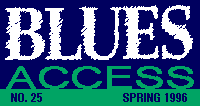


 | ||
 |
About our survey: We've tabulated the early arrivals in last issue's BLUES ACCESS survey and have come up with some interesting numbers to date. (We'll give you our final tally next issue.)

Based on a little over 200 responses we've learned that the
typical BLUES ACCESS reader (or survey responder, anyway)
is a male baby boomer with at least some college education. That's
not too surprising, but the weight of numbers behind that profile
is. We're seeing that our readership is 90% male, 96% over
the age of 30 (72% between 31 and 46) and 56% college grads (83%
have some college).
Give the ladies some: I've been trying to figure out just what these figures signifiy. I mean it's not exactly like we've been putting half-naked babes on the cover to attract drooling guys. When I go to concerts and festivals the fair sex seems well-represented. (You know, they're the ones that don't have their fists in the air while they holler, "Awwwww-riiiight!") And there are plenty of women actively involved in blues societies. So tell me sisters, why are so few of you reading about the blues? (Or is it just that males are more into filling out surveys?)
Generation gap, for real: And how about the so-called Generation Xers? I didn't expect a huge number, but 4 percent?
My assistant John Schaefer, who is still looking up at 30 (but who also has big musical ears) says it's because young people are not exposed to this kind of music. He looks at me in disbelief when I tell him that I used to hear Little Willie John, Bobby Bland and pre-Coca Cola Ray Charles on the radio when I was a kid.
This has generated some discussion in our folder on America Online. (To find it, use keyword MMC, then successively open folders titled Jazz/Blues>Blues>BLUES ACCESS.)
One of our AOL correspondents agrees with John: "First, there's not that many stations that play blues. Most that do are noncommercial stations that the under-30s don't listen to. Second, if you listen to the music the under-30s listen to you should know most of them will never care about the blues. It's not realistic to expect them to listen to blues. The early blues singers are difficult to listen to because of the sound quality, and you know if you don't catch their attention right away they will not stick around."
Someone else answers: "I don't know. I can understand what Muddy Waters sings. So far, I've figured out about five words in Nirvana's songs. But I think I know what you mean. We can watch a black-and-white movie: the image is fine, but it looks so old-fashioned to someone who grew up only with color TV, film and computers."
Just to be argumentative ... why wouldn't under-30s listen to noncommercial radio? We're not talking about teeny boppers. After all, a 25-year-old may well be college-educated and could have easily outgrown Top 40. And there are plenty of college radio stations that have blues shows and are serviced by the larger blues indy labels.
Don't people in their teens and 20s read anymore? Is it really true they're so "media-trained" that they can only pay attention to brightly colored, fast-moving images and are no longer capable of reflection?
I realize I'm an unusual case, but I was listening to R&B when I was in college and started getting deep into blues in my early 20s. I pored over anything I could get my hands on (which was mostly album jackets) to learn more about the music.
But I will grant you -- and this is a bone that as a radio person I've been picking on for years -- that commercial radio shoulders a big portion of the blame for the kind of pablum that they are force-feeding people (and not just young people).
We at BLUES ACCESS would very much like to include more young people in our musical circle. After all, they are the future of the blues. Write and tell us your thoughts on the subject, and your suggestions for how we can broaden our appeal without diluting the product.
For the time being we'll give the last word to an e-mail message from Marty Adler, a Gen-Xer who works for the Ultimate Rhythm and Blues Cruise: "Keep up the great work, Cary and Leland, but forget about putting the Chili Peppers on the cover of BLUES ACCESS. They're just not worthy."
Another man done gone: We learned at press time of the passing of Brownie McGhee in mid-February. He was 80 and had been suffering for some time from stomach cancer. Jim O'Neal once called Brownie "probably the most underrated, or at least underappreciated, bluesman on the planet." In the '60s, his recordings with Sonny Terry were responsible for drawing many folk enthusiasts into the blues. More on Brownie next issue.
Virtual blue: As the giant network of people, computers and information that is the Internet continues to expand, it incorporates more facets of popular culture. As it applies to blues I can see a lot of positives. The word "access" in the title of this magazine is no accident. My original concept, back in 1989, was for a publication that would be a sort of Whole Earth Catalog of the blues. That forward-thinking relic of the early-'70s described itself as an "access to tools."
Despite the seeming unresolvable incongruity between high technology and somebody like a young Luther Allison playing a crude homemade baling wire-strung guitar, there are useful connections to be made. Among its many imaginable possibilities, the 'Net holds great promise for its potential to spread knowledge from the hands of a few to a much larger population. In simple blues terms, that means more people can have -- there's that word again -- access to the music at whatever level of interest they choose to pursue. To my mind, that is a good thing.
There is a commercial potential, too, as the stumbling blocks to secure electronic financial transactions are removed. Technological advances are making it easier to listen to music clips on the World Wide Web.
Some of these things have been touched on in previous issues. On page 36, Steve Knopper shares the result of his recent delvings into what passes for blues on the 'Net.
We've created an all-new online version of BLUES ACCESS that will let us exploit this medium and eventually build an archive of back issues (starting with BA #24). While you won't get all the depth that's in the hard copy of the magazine, we think you'll find it a lively and entertaining place to explore. (Our URL is http://rock.he.net/~blues... but you know that, don't you? ;-)
Once our web wizard Jeremy McCaleb works out the details and we bring our advertisers onboard, you will be able to do some cool interactive things. For example, imagine reading a review and clicking on a song title to hear a snatch of the song, then clicking on a button that takes you directly to the record label's site where you can order the CD. It's something you'll be doing very soon, and only a hint of what's to come.
And if you feel left out because you don't own a computer or don't know anything about them, check with your local public library. Many are set up to access the World Wide Web and can help you get up and running in a hurry. If you're a blues musician or business that wants to set up a site of your own, call Jeremy at (303) 604-0224 and he'll explain the services we now offer, or as we've learned, email him at jmccaleb@netcom.com, since you might have a hard time catching him off-line.
It is indeed a Brave Blue World, baby.
-- CW
 |
 |